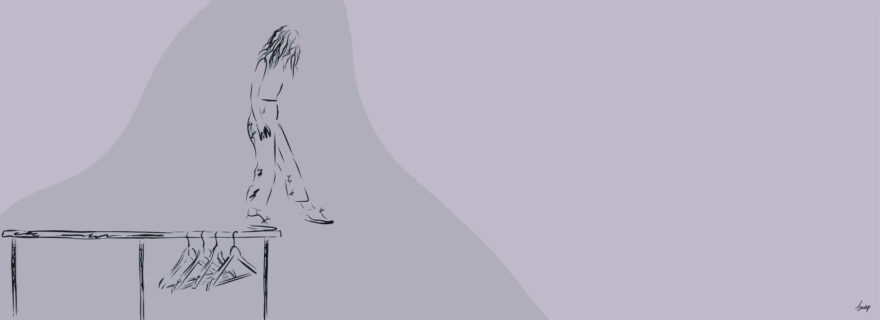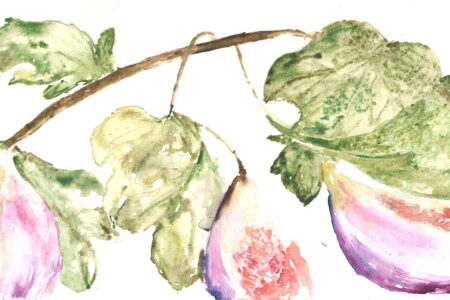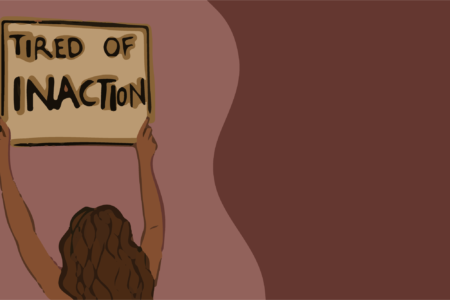Balancing like the Buddha: Finding my Middle Way
We all love the feeling of a pair of jeans that hugs our bodies just right, and the power and confidence that comes from wearing an outfit that embodies who we are and how we want the world to see us. Fashion can be a beautiful thing. It can help us express ourselves, identify with ourselves, and love ourselves. In this sense, fashion is creative, demonstrative, and meaningful. Notwithstanding, many current fashion trends are having a harmful effect on our planet. Why is this the case, and what can we do to aid this issue?
Fashion – especially clothes – has played a tremendous part in shaping our social, political, economic, and spiritual realms, throughout almost all of human time. Recent times, however, have shown a shift in our attitudes towards these beautiful threads and fabrics. The love and care that our grandparents showed their clothing has been replaced with the same short attention span and desire for instant gratification that has become prominent in today’s day and age. Next Gen Finance reports that “the average person today buys 60 percent more items of clothing than they did 15 years ago.” To illustrate, that would mean rather than buying one sandwich for your lunch, you're purchasing an extra half (and a bit, 0.6 extra), just because you can. They go on to say that “consumers keep that clothing for only half as long as they used to … one in three young women consider clothes ‘old’ after wearing them once or twice. One in seven consider it a fashion faux-pas to be photographed in an outfit twice.” To continue with our sandwich metaphor, that means you’re not only buying that extra half of a sandwich, but you’re throwing a quarter of it in the bin, and likely never returning to that same delicious sandwich shop again.
This phenomenon – the desire for more and more clothes that keep up with ever-changing fashion trends, and the remarkably low prices they are being sold at – has been termed ‘fast fashion’. The large factories these clothes are produced in are major contributors to CO2 emissions; their cheap production and materials make them more likely to be thrown away sooner, filling up landfills in our precious soil; and the materials they are made with are often a mix of different synthetic plastics, making them nearly impossible to recycle. Not to mention the cheap and unethical labour that is often tied to fast fashion companies, as well as the great distances they are shipped from producer to consumer, leaving a trail of fossil fuel emissions in their travels.
I too have been a perpetuator of the fast fashion industry. I used to buy entire new outfits for a single concert, birthday party, or date, and then let those clothes sit in the depths of my closet until they reached a charity box or landfill. My closet was filled with labels from Zara, H&M, Forever 21, and Brandy Melville. Every time I’d go shopping, I’d find an adorable tiny top, or new bikini that seemed like it was made for me. I understand better now that, in a way, it was – as I was the prime target audience for these opportunistic companies.
Beyond that, we live in a world where we’ve been brainwashed into thinking that consumerism and spending will make us ‘feel better’. There’s even a term for it – ‘retail therapy’. Though it pains me to think about my past actions, I try not to spend time lamenting over my naive past. I instead choose to move forward best as I can and be creative with the ways that I adapt my lifestyle to be more sustainable.
In 2019, I moved to a small village in France to be an au pair for a year. It was an incredible experience filled with joys, lessons, and memories; but it wasn’t until I returned to my home in the United States that I really felt as if my eyes had been opened in a new way. The first thing I noticed was the plastic. The night I got home, my parents (very lovingly) served me dinner on a paper plate and plastic cutlery. This was a normal practice for my family, and most other families I had known growing up. I was beyond appalled. Only at that moment did I realise that I had not seen a single piece of disposable dishware in a house or store in over a year. Even the restaurants used compostable take-away containers. From there, I began to notice all the cultural differences – the girls I was caring for came home from school telling me about their composting and recycling lessons, things I had never been exposed to before in my life. There were bike lanes larger than roads, whereas I was terrified to ride a bike in my California suburb out of fear of being hit by a car. This revelation kickstarted my deep passion for sustainability. My actions and interests ranged from different composting practices to ‘zero-waste lifestyle’, to veganism, to political lobbying, to renewable energy, and so much more. I was taking a deep look at the footprint my lifestyle and consumption methods were having on the planet, and fashion was an inevitable aspect of that journey.
In 2021, I decided I was not going to buy a new piece of clothing for the entire year, only thrift or buy second hand. I should mention that this wasn’t too dramatic of a goal for me, as I’ve become quite a minimalist over the past few years, but still, I wanted to see how it would go. The year came to an end, and I was successful in my goal. I managed quite easily to maintain a closet that I felt comfortable and confident in without having to purchase anything brand new.
However, upon reflecting on the year, I realised something even more valuable. In June, I attended a wedding. I remember scouring second hand shops and Depop trying to find a nice dress for the occasion. Stressed and slightly disappointed, I eventually found one that I decided could work, though I was far from ecstatic about it. Looking back on that, I realised that I was sacrificing my personal comfort and happiness for what I saw as ‘the good of the planet’. I have a deep desire to do what I can to slow climate change, but I also like to dress up, have fun, and let loose. So where should the line be drawn?
I tried my hardest to not buy any new clothing as a mission to play my part in the climate crisis, but at times, it hindered my own enjoyment of life. This lesson goes for every aspect of individual action. There is a notion that these actions need to be ‘all or nothing’, you have to be fully vegan, you can never buy something wrapped in plastic again. I believe this is the wrong approach. You don’t need to cut meat out of your life entirely, but if you eat half as much as you did a week before, that is already a major improvement. You don’t need to sell your car, just make it a goal to walk or bike to the store once a week instead of driving. And the list goes on. Any action you take towards bettering the planet should be recognised and praised. By making a change in your lifestyle, no matter how big or small, you are reconnecting yourself to spaceship Earth and serving as an example to others. Some call it compromise, Buddha, in his many teachings, refers to this type of equilibrium as the ‘Middle Way’. To live a life that is sustainable for both the planet, but also our own personal well-being, we need to find a balance.





0 Comments